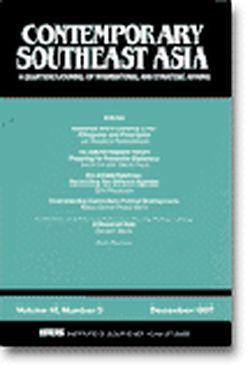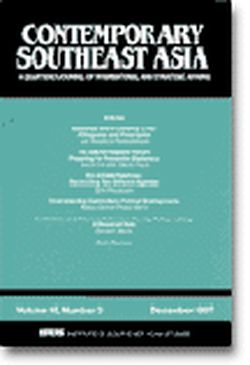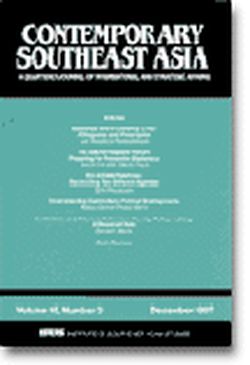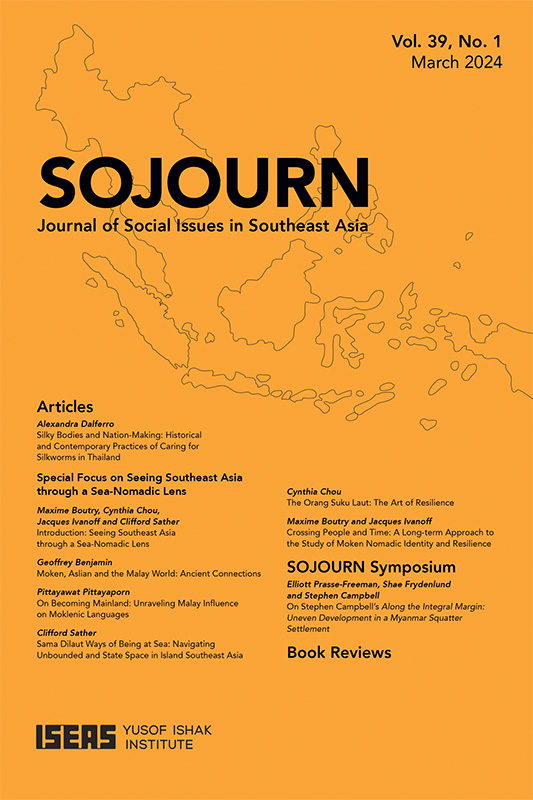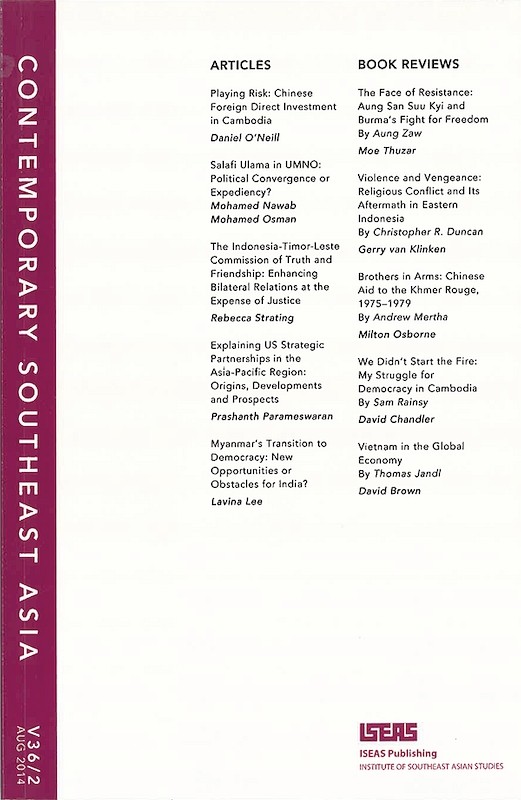Contemporary Southeast Asia: A Journal of International and Strategic Affairs Vol. 13/2(Sept 1991)
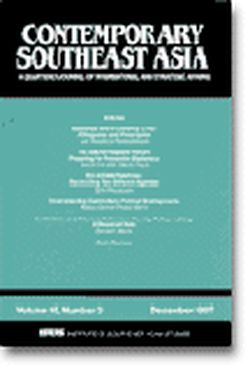
Date of publication:
September 1991
Number of pages:
125
Code:
CS13/2
Contents
-
Preliminary pages
- ARTICLES
-
The Cambodia Conflict: The Path towards Peace, by Frank Frost, author see abstractThe article examines the recent evolution of the Cambodia conflict, the positions of major internal and external parties, and prospects for settlement in mid-1991. Conflict persisted throughout the 1980s at the domestic, regional and international levels simultaneously, and efforts at negotiation were confronted by two intractable obstacles: the Cambodian parties' bitter divisions and the impasse in Sino-Vietnumese relations. Major changes at the regional and international levels in the late 1980s affected the conflict substantially: the "State of Cambodia", while withstanding with difficulty the challenge from the guerrilla coalition's National Government of Cambodia, faced severe cuts in its external support; regional and international tensions over the conflict declined after Vietnam's withdrawal of forces in 1989; and the United Nations developed in 1990 a detailed framework for settlement. Up to mid-1991, the outlook for negotiations still seemed unpromising, but developments in Jakarta and Pattaya enhanced settlement prospects. Durable peace, however, would require not just an absence of conflict but also socioeconomic reconstruction and political stability.
-
United States Human Rights Policy towards Burma, 1988-91, by Andrew M Deutz, author see abstractOfficial U.S. interests in Burma have principally been concerned with limiting narcotics production, developing trade and investment, and fostering human rights. Throughout the 1980s, U.S. policy and assistance concentrated on Burma's opium production, but the military crack-down of 1988 sharply refocused U.S. attention. The United States suspended all anti-narcotics funding and development assistance to Burma, amounting to US$12 million annually. The renewal of U.S. assistance remains conditional upon improvements in the Burmese Government's respect for human rights and the seating of a popularly mandated government. Many of Burma's regional trading partners took a different position and placed economic relations over human rights concerns, which has meant that the prospects for comprehensive, multilateral trade and arms sanctions are bleak. A multilateral approach would be the most effective means of pressuring the Burmese authorities to improve their human rights record, but such an approach is confined by the limits of the international consensus concerning human rights and how they should be protected and promoted. In the meantime, there are some limited initiatives that the United States can unilaterally undertake, such as facilitating the admittance into the United States of Burmese students who face political persecution as well as easing requirements for granting them refugee status.
-
Politics in the South Pacific Region, by Kai M Schellhorn, author see abstractIn the mid-1980s, international politics in the South Pacific region was shaped by the Soviet Union's desire to gain political influence. Concerted action led by the United States and backed by Australia, New Zealand, France, Japan and Germany hampered Moscow's strategic interests in the region. Today, the region suffers more from domestic violence and political and economic problems than from the interference of extra-regional powers. The coup d'etat in Fiji in 1987; political turbulence in Vanuatu in 1988 and in Popua New Guinea since then; militant action in New Caledonia and political confrontations in Tonga and the Solomon Islands, all characterize the present political situation. The political future of the South Pacific region will increasingly be influenced by the gradual rise in domestic instability and less so by foreign interference in the tiny island states.
-
The Problem of Perception and Sino-British Relations over Hong Kong, by Lo Shiu-Hing , author see abstractSino-British relations over Hong Kong's future beyond 1997 have not been easy ever since the matter became a subject of negotiations between the two countries. Despite the Joint Declaration of 1984 and some easing of tensions during 1984-88, mutual distrust did not diminish. Britain's desire that Hong Kong should enjoy a degree of political and administrative autonomy after 1997 became a sore point with China. Chinese officials continue to see "sinister" motives in British policy, while Britain's image of China as a relatively strict observer of international agreements has been tarnished, especially after the Tiananmen incident in June 1989. The recent agreement over the airport project has not changed mutual perceptions of distrust. Sino-British relations will remain tense. Britain's desire to achieve a degree of autonomy for Hong Kong will come up against China's intention to limit the scope of any such autonomy.
-
External Influences on Contemporary Islamic Resurgence in Malaysia, by Mohamad Abu Bakar, author see abstractThe article attempts to show the various external factors which have been largely responsible for reinforcing the growth and shaping the direction of Islamic resurgence among the Muslim Malays in the lost two decades. While admitting the importance Of outside influences in the promotion of Malaysian Islam, basically it is re-education in Islam within Malay society which has created a supportive environment for the adoption of a more Islamic outlook and prepared the climate of thought leading to the revival of Islamic sentiments. Consequently, the Malay masses have become not only more aware of the need for a fuller implementation Of religious rulings in both private and public lives, but also highly susceptible to religious influences from outside in transforming their society along Islamic fundamentalist lines.
- BOOK REVIEWS
-
BOOK REVIEW: Asia and the Major Powers: Domestic Politics and Foreign Policy edited by A Scalapino, Seizaburo Sato, Jusuf Wanandi and Sung-Joo Han, by Timo Kivimaki, author
-
BOOK REVIEW: Fiji: The Politics of Illusion by Deryck Scarr, by Alan Robson, author
-
BOOK REVIEW: War by Other Means: National Liberation and Revolution in Vietnam, 1954-1960 by Carlye A Thayer, by Clive Christie, author
-
BOOK REVIEW: Laos: Beyond the Revolution by Joseph J Azsloff and Leonard Unger, by Nick J Freeman, author

